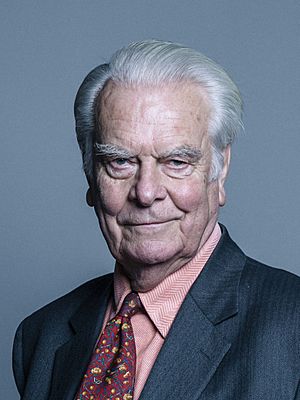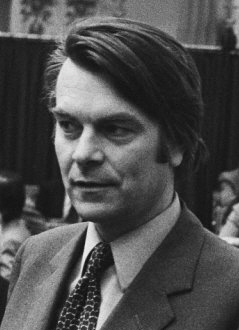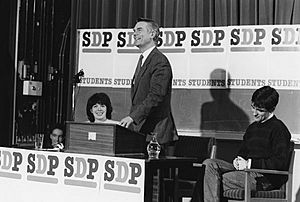David Owen facts for kids
Quick facts for kids
The Lord Owen
|
|||||||||||||||||||||||||||||||||||||||||||||||||||||||
|---|---|---|---|---|---|---|---|---|---|---|---|---|---|---|---|---|---|---|---|---|---|---|---|---|---|---|---|---|---|---|---|---|---|---|---|---|---|---|---|---|---|---|---|---|---|---|---|---|---|---|---|---|---|---|---|

Official portrait, 2018
|
|||||||||||||||||||||||||||||||||||||||||||||||||||||||
| Secretary of State for Foreign and Commonwealth Affairs | |||||||||||||||||||||||||||||||||||||||||||||||||||||||
| In office 21 February 1977 – 4 May 1979 |
|||||||||||||||||||||||||||||||||||||||||||||||||||||||
| Prime Minister | James Callaghan | ||||||||||||||||||||||||||||||||||||||||||||||||||||||
| Preceded by | Anthony Crosland | ||||||||||||||||||||||||||||||||||||||||||||||||||||||
| Succeeded by | The Lord Carrington | ||||||||||||||||||||||||||||||||||||||||||||||||||||||
|
|||||||||||||||||||||||||||||||||||||||||||||||||||||||
|
|||||||||||||||||||||||||||||||||||||||||||||||||||||||
|
|||||||||||||||||||||||||||||||||||||||||||||||||||||||
|
|||||||||||||||||||||||||||||||||||||||||||||||||||||||
| Personal details | |||||||||||||||||||||||||||||||||||||||||||||||||||||||
| Born |
David Anthony Llewellyn Owen
2 July 1938 Plympton, Devon, England |
||||||||||||||||||||||||||||||||||||||||||||||||||||||
| Political party | Independent (1990–present) | ||||||||||||||||||||||||||||||||||||||||||||||||||||||
| Other political affiliations |
|
||||||||||||||||||||||||||||||||||||||||||||||||||||||
| Spouse |
Deborah Schabert
(m. 1968) |
||||||||||||||||||||||||||||||||||||||||||||||||||||||
| Children | 3 | ||||||||||||||||||||||||||||||||||||||||||||||||||||||
| Alma mater | |||||||||||||||||||||||||||||||||||||||||||||||||||||||
| Signature |  |
||||||||||||||||||||||||||||||||||||||||||||||||||||||
David Anthony Llewellyn Owen, Baron Owen (born 2 July 1938) is a British politician and doctor. He was a Member of Parliament (MP) for 26 years, from 1966 to 1992.
He served as the Secretary of State for Foreign and Commonwealth Affairs for the Labour Party from 1977 to 1979. Later, he became a leader of the Social Democratic Party (SDP). In 1981, he was one of the "Gang of Four" who left the Labour Party to start the SDP. He was the only one of the four who did not join the Liberal Democrats when the SDP merged with the Liberal Party.
Lord Owen led the Social Democratic Party from 1983 to 1987. He then led a smaller "continuing SDP" from 1988 to 1990. In 1992, he became a life peer and sat in the House of Lords as an independent member until he retired in 2024.
Contents
Early Life and Education
David Owen was born in 1938 in Plympton, near Plymouth, England. His parents were Welsh. He went to Sidney Sussex College, Cambridge, to study medicine in 1956. He then continued his medical training at St Thomas's Hospital in London.
In 1962, he became a qualified doctor and started working at St Thomas's Hospital. He also worked as a specialist in neurology and psychiatry for two years.
Starting in Politics
In 1960, David Owen joined the Labour Party. In 1964, he ran for Parliament in the Torrington area but did not win.
At the next election in 1966, Owen was elected as a Labour MP for Plymouth Sutton. He was only 27 years old, making him one of the youngest MPs in Parliament. In 1974, he became the MP for Plymouth Devonport, which he held until 1992.
From 1968 to 1970, Owen worked as a junior minister for the Royal Navy under Prime Minister Harold Wilson. After the Labour Party lost the 1970 election, he became a spokesperson for defence. He later resigned from this role in 1972 because he disagreed with Labour's view on the European Economic Community.
In 1974, when Labour returned to power, he became a junior minister for Health. He was promoted to Minister of State for Health in July 1974.
Key Roles in Government
As Minister of State for Health, David Owen wanted Britain to produce its own blood products, like Factor VIII. This was to avoid risks from blood imported from other countries. He believed this policy was important for public safety.
In September 1976, Prime Minister James Callaghan appointed Owen as a Minister of State at the Foreign Office. Just five months later, the Foreign Secretary, Anthony Crosland, passed away. Owen was then appointed as the new Foreign Secretary. At 38, he was the youngest person to hold this important job in over 40 years.
As Foreign Secretary, Owen worked on plans for Rhodesia (now Zimbabwe). He also wrote a book called Human Rights and supported human rights in Africa and the Soviet Union.
After Labour lost the 1979 election, Owen became the Shadow Energy Secretary.
Forming the Social Democratic Party
In 1980, Michael Foot became the leader of the Labour Party. This made some moderate Labour politicians, including David Owen, concerned about the party's direction.
In early 1981, Owen and three other senior Labour politicians – Roy Jenkins, Bill Rodgers, and Shirley Williams – decided to leave the Labour Party. They formed a new group called the "Council for Social Democracy," which became the Social Democratic Party (SDP). This group was known as the "Gang of Four".
Twenty-eight other Labour MPs and one Conservative MP joined the new party. In late 1981, the SDP teamed up with the Liberal Party to form the SDP–Liberal Alliance. This alliance aimed to have a better chance in elections.
In the 1983 general election, the Alliance won 25% of the votes but only 23 seats. After this, Roy Jenkins resigned as SDP leader, and David Owen became the new leader.
Leading the SDP
David Owen was seen as a strong leader for the SDP. He kept the party in the public eye and maintained its independence from the Liberals. Under his leadership, the SDP gained more seats in Parliament through special elections.
However, the SDP–Liberal Alliance faced disagreements on important issues, like the miners' strike of 1984–85 and nuclear weapons. These differences made the Alliance seem less united to voters.
In the 1987 general election, the Alliance again did not win many seats. After this, the Liberal leader David Steel suggested that the Liberal and SDP parties should fully merge. Owen disagreed, wanting to keep the SDP's distinct identity.
Despite Owen's wishes, most SDP members supported the merger. The Liberal Party and SDP officially merged in March 1988 to form the Social and Liberal Democrats, later renamed the Liberal Democrats.
Owen continued to lead a much smaller "continuing SDP" with a few other MPs. However, after some poor election results, Owen decided to close down this party in 1990.
After Parliament: A Life Peer
After leaving Parliament in 1992, David Owen was made a life peer by Prime Minister John Major. This meant he became a member of the House of Lords with the title Baron Owen. He sat in the House of Lords as an independent member until he retired in 2024.
Lord Owen has continued to be involved in politics and public life. He was approached by Tony Blair, then leader of the Labour Party, in 1996 to support New Labour, but Owen declined. He also advised on the NHS and commented on various political events.
In 2014, he donated to the Labour Party and began sitting in the House of Lords as an "Independent Social Democrat." In 2017, he supported the Labour candidate in his former constituency. However, in 2019, he criticized the Labour leadership and said he would not support the party.
International Work
In 1992, Lord Owen was chosen by British Prime Minister John Major to be the European Union's co-chairman for the conference on the Former Yugoslavia. He worked with Cyrus Vance from the United Nations.
Owen helped create the Vance–Owen Peace Plan in 1993, which aimed to bring peace to the region. He continued to work on peace efforts in the former Yugoslavia until 1995. For his work, he was made a Member of the Order of the Companions of Honour in 1994.
Other Activities
Lord Owen has held various positions in businesses, including a Russian petroleum company and a US healthcare company. He was also the Chancellor of the University of Liverpool from 1996 to 2009.
He has written many books, including some about how illness can affect leaders in power. He is also involved with the Daedalus Trust, which studies how power can influence people's personalities and decisions.
Family Life
David Owen married Deborah Schabert, an American literary agent, in 1968. They have three children: two sons named Tristan and Gareth, and a daughter named Lucy.
Selected Books
- David Owen, The Politics of Defence (1972)
- David Owen, In Sickness and in Health: the Politics of Medicine (1976)
- David Owen, Human Rights (1978)
- David Owen, Face the Future (1981)
- David Owen, A Future That Will Work (1984)
- David Owen, A United Kingdom (1986)
- David Owen, Our NHS (1988)
- David Owen, Time to Declare (1992)
- David Owen, Balkan Odyssey (1995)
- David Owen, The Hubris Syndrome: Bush, Blair and the Intoxication of Power (2007)
- David Owen, In Sickness and in Power: Illness in Heads of Government During the Last 100 Years (2008)
- David Owen, Time to Declare: Second Innings (2009)
- David Owen, Nuclear Papers (2009)
- David Owen, Europe Restructured (2012)
- David Owen, "The Health of the Nation. NHS in Peril" (2014)
- David Owen, The Hidden Perspective: the Military Conversations 1906–1914 (2014)
- David Owen, "Cabinet's Finest Hour. The Hidden Agenda of May 1940" (2016)
- David Owen, Riddle, Mystery, and Enigma. Two Hundred Years Of British–Russian Relations (2021)
Images for kids
See also
 In Spanish: David Owen para niños
In Spanish: David Owen para niños






